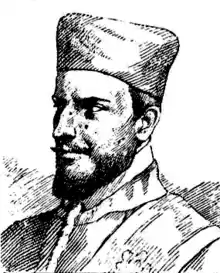Elena[1][2] is a three-act dramma per musica in a prologue and three acts by Francesco Cavalli, set to a libretto originally by Giovanni Faustini, dying in 1651 before the completion of the work, and was later completed by Nicolò Minato. The opera was first performed in Venice at the Teatro San Cassiano; the dedication is dated to 26 December 1659. The opera was performed again in 1661 in Palermo, Italy yet only revived again in 2013 with the Aix-en-Provence Festival.[3][4]
Just like many other operas by Cavalli, Elena includes a ballo, or an Italian dance which incorporates singers, choristers, and instrumentalists. However, it soon began to be replaced by something analogous to the intermedio, sometimes incorporating a chorus.[5]
Roles
| Character | Voice Type |
|---|---|
| Discordia disguised as peace | Soprano |
| Venus | Soprano |
| Peace | Soprano |
| Wealth | Silent role |
| Truth | Soprano |
| Love | Silent role |
| Pallas | Soprano |
| Abundance | Silent role |
| Two Furies | Silent role |
| Tyndareus | Bass |
| Helena | Soprano |
| Menelaus | Soprano |
| Tesedo | Tenor |
| Peritoo | Alto |
| Hippolyta | Soprano |
| Eurite | Alto |
| Erginda | Soprano |
| Diomedes | Tenor |
| Eurypylus | Tenor |
| Iro | Tenor |
| Creon | Tenor |
| Menesteo | Soprano |
| Antilochus | Tenor |
| Castore | Soprano |
| Pollux | Soprano |
| Neptune | Bass |
| Choirs of Cerulean Deities | Soprano, Contralto, Tenor |
| Argonauti e Schiavi | Tenor, Bass |
Plot
The Greek prince Menelaus (nephew of the king of Crete Atreus) and Theseus, king of Athens, are in love with Helen, a woman of rare beauty, famous for the fire of Troy. Menelaus, to get closer to Helen, dresses as a woman to come and serve her by pretending to be an Amazon. One day Peritous, seeing him in women's clothes fighting with Elena and therefore believing him to be a woman, falls in love with her. Theseus kidnaps Helen, since he had sworn not to marry except with a daughter of Jupiter - and Helen was reputed to have been fathered by Jupiter in the guise of a swan. To kidnap Helen, he abandons Hippolyta, a prisoner received as a gift from Hercules and in love with Theseus, who when she goes to look for him discovers that he has kidnapped Helen and is therefore disdained and torn in her love for her. Helen will be freed by her brothers, Castor and Pollux; Hippolyta's affection strikes Theseus, who decides to marry her; Menelaus, having discovered himself, marries Helen.[6]
Recordings
- video live Emöke Baráth (Elena, Venere), Valer Barna-Sabadus (Menelao), Fernando Guimarães (Teseo), Rodrigo Ferreira (Ippolita, Pallade: Solenn’ Lavanant Linke Peritoo), Emiliano Gonzalez Toro (Iro), Anna Reinhold (Tindaro, Nettuno), Mariana Flores (Erginda, Giunone, Castore), Majdouline Zerari (Eurite, La Verita),...Aix-en-Provence Festival, July 2013. DVD - conductor Leonardo García Alarcón, director Jean-Yves Ruf. Ricercar[7]
References
- ↑ Allacci, Leone; Cendoni, Giovanni; Zeno, Apostolo (1755). Drammaturgia di Lione Allacci: accresciuta e continuata fino all'anno MDCCLV (in Italian). Presso G. Pasquali.
- ↑ operaramblings (2018-03-16). "Cavalli's Elena". operaramblings. Retrieved 2023-12-27.
- ↑ "ELENA Opera di Francesco CAVALLI". web.archive.org. 2021-09-12. Retrieved 2023-12-27.
- ↑ "Cavalli's Elena". www.medici.tv. Retrieved 2023-12-27.
- ↑ Alm, Irene; Heller, Wendy; Harris-Warrick, Rebecca (2003). "Winged Feet and Mute Eloquence: Dance in Seventeenth-Century Venetian Opera". Cambridge Opera Journal. 15 (3): 216–280. ISSN 0954-5867.
- ↑ "Digitale Bibliothek - Münchener Digitalisierungszentrum". daten.digitale-sammlungen.de. Retrieved 2023-12-27.
- ↑ review
